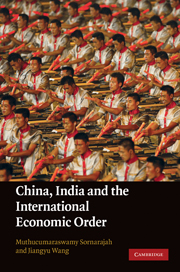Book contents
- Frontmatter
- Contents
- Notes on contributors
- Preface
- Introduction and overview
- PART I China, India and the global trade system
- PART II China, India and regional economic integration in Asia
- PART III Law and development in China and India: Domestic issues
- 14 Law and development in China and India
- 15 The development of modern corporate governance in China and India
- 16 An institutional race
- Index
- References
14 - Law and development in China and India
from PART III - Law and development in China and India: Domestic issues
Published online by Cambridge University Press: 03 May 2011
- Frontmatter
- Contents
- Notes on contributors
- Preface
- Introduction and overview
- PART I China, India and the global trade system
- PART II China, India and regional economic integration in Asia
- PART III Law and development in China and India: Domestic issues
- 14 Law and development in China and India
- 15 The development of modern corporate governance in China and India
- 16 An institutional race
- Index
- References
Summary
At first glance, China and India seem to contradict the basic premise of the law and development movement that law plays a key causal role in economic growth. According to the standard view, China has enjoyed high growth rates despite weak legal institutions and the lack of rule of law, while India's growth rates have lagged far behind China's despite a reputation for rule of law and stronger legal institutions. Closer examination however reveals that the experiences of China and India are not as inconsistent with the prevailing wisdom regarding the relationship between law and development as is often suggested.
General law and development lessons
At the risk of reiterating the obvious, let us begin with some general lessons of the new law and development movement. First, “rule of law” and a functional legal system are necessary but not sufficient for sustained growth. The empirical evidence is surprisingly consistent about this general relationship.
Second, the relationship between rule of law and economic growth is non-linear. Legal institutions are costly. There is less need for formal legal institutions in predominantly rural economies where contracting parties are bound together in tight social networks and there are informal mechanisms for enforcing contracts.
Third, informal mechanisms may provide a useful supplement, but they are not adequate substitutes for functional formal institutions in a reasonably developed economy. Informal mechanisms operate against a background of formal institutions, and often could not function without the possibility of ultimately turning to the courts should other means for resolving the dispute fail.
- Type
- Chapter
- Information
- China, India and the International Economic Order , pp. 491 - 512Publisher: Cambridge University PressPrint publication year: 2010



